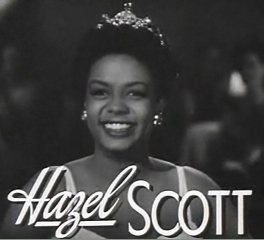
Hazel Dorothy Scott was a Trinidad-born American jazz and classical pianist and singer. She was an outspoken critic of racial discrimination and segregation. She used her influence to improve the representation of Black Americans in film.
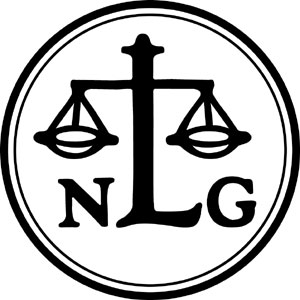
The National Lawyers Guild (NLG) is a progressive public interest association of lawyers, law students, paralegals, jailhouse lawyers, law collective members, and other activist legal workers, in the United States. The group was founded in 1937 as an alternative to the American Bar Association (ABA) in protest of that organization's exclusionary membership practices and conservative political orientation. They were the first US bar association to allow the admission of minorities to their ranks. The group sought to bring more lawyers closer to the labor movement and progressive political activities, to support and encourage lawyers otherwise "isolated and discouraged," and to help create a "united front" against Fascism.
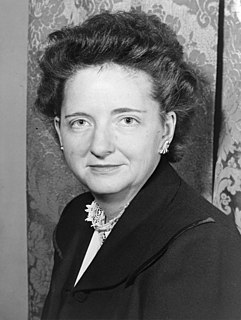
Elizabeth Terrill Bentley was an American spy and member of the Communist Party USA (CPUSA). She served the Soviet Union from 1938 to 1945 until she defected from the Communist Party and Soviet intelligence by contacting the Federal Bureau of Investigation (FBI) and admitting her own activities.
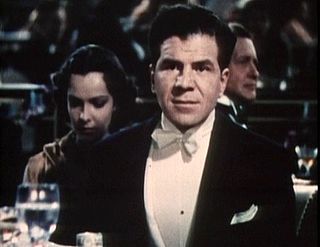
Lionel Jay Stander was an American actor in films, radio, theater and television. He is best remembered for his role as majordomo Max on the 1980s mystery television series Hart to Hart.

Jean Rouverol was an American author, actress and screenwriter who was blacklisted by the Hollywood movie studios in the 1950s.
William Walter Remington (1917–1954) was an economist employed in various federal government positions until his career was interrupted by accusations of espionage made by the Soviet spy and defector Elizabeth Bentley. He was convicted of perjury in connection with these charges in 1953, and murdered in prison in 1954.

Robert Walker Kenny, 21st Attorney General of California (1943-1947), was "a colorful figure in state politics for many years" who in 1946 ran unsuccessfully against Earl Warren for state governor. In 1947, he led the defense of the Hollywood Ten.
Isobel Lennart was an award-winning American screenwriter and playwright. She is best known for writing the book for the Broadway musical Funny Girl which premiered in 1964, although she also wrote scripts for successful Hollywood films featuring major stars, some of which received Oscar nominations.

Jerry Joseph O'Connell was an American attorney and politician. He is most notable for his service as a member of the United States House of Representatives from Montana.
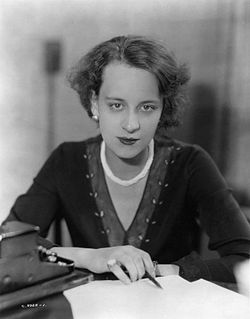
Georgia Belden Backus was an American character actress on stage, radio and screen. She was also a writer, director and producer of radio dramas. In 1930 she was named dramatic director of the Columbia Broadcasting System, to guide the development of the new art of the radio play. A member of the repertory company presenting Orson Welles's Mercury Theatre radio programs, she played supporting roles in some 30 films during the 1940s and 1950s. Her first screen credit was Citizen Kane (1941), in which she played the severe assistant in the Thatcher library. Her career was ended by the Hollywood blacklist.
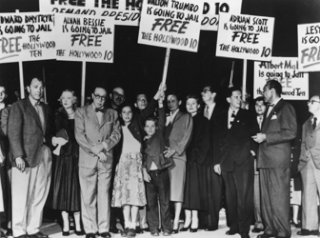
The Hollywood blacklist was an entertainment industry blacklist, broader than just Hollywood, put in effect in the mid-20th century in the United States during the early years of the Cold War. The blacklist involved the practice of denying employment to entertainment industry professionals believed to be or to have been Communists or sympathizers. Actors, screenwriters, directors, musicians, and other American entertainment professionals were barred from work by the studios.

The House Committee on Un-American Activities (HCUA), popularly dubbed the House Un-American Activities Committee (HUAC), was an investigative committee of the United States House of Representatives, created in 1938 to investigate alleged disloyalty and subversive activities on the part of private citizens, public employees, and those organizations suspected of having either fascist or communist ties. It became a standing (permanent) committee in 1945, and from 1969 onwards it was known as the House Committee on Internal Security. When the House abolished the committee in 1975, its functions were transferred to the House Judiciary Committee.
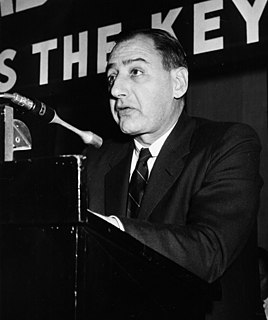
Harold I. Cammer was an American lawyer who co-founded the National Lawyers Guild. He was known for his participation in labor law, civil rights, peace and justice issues, and freedom of speech cases; in particular, defending those accused of communist leanings.

Frances Elizabeth Williams was an American actress, activist, theatre producer, organizer, and community worker. Williams was the first black woman to run for the California State Assembly in 1948 on the Progressive Ticket and served on the boards of the Screen Actors Guild, Actors' Lab, and Actors Equity. She represented the World Peace Council at the first Angola Independence Celebration in 1975, and co-founded the Art Against Apartheid Movement in Los Angeles in the 1980s.
The International Juridical Association was an association of socially minded American lawyers, established by Carol Weiss King and considered by the U.S. federal government as "another early (communist) front for lawyers. The principal concern about the IJA was that it "constituted itself an agent of a foreign principal hostile to the interests of the United States."

Counterattack was a weekly subscription-based, anti-communist, mimeographed newsletter, which ran from 1947 to 1955 and was published by a "private, independent organization" of the same name and started by three ex-Federal Bureau of Investigation agents.
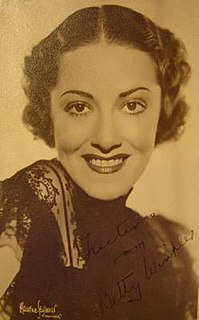
Betty Winkler was an American radio actor. She studied acting at the Cleveland Playhouse. She was a radio performer in Chicago and New York City in the 1930s and 1940s. She performed in a number of radio shows, including dramas, comedies, and variety shows. During the late 1930s, Winkler was considered one of radio's top stars.
David Rein (1914–1979) was a 20th-Century American attorney who, with partner Joseph Forer, supported Progressive causes including the legal defense of African-Americans and accused Communists. Rein and Foyer were members of the National Lawyers Guild and its D.C. chapter. Rein represented "more than 100 people", alleged to have been Communists, before the House Un-American Activities Committee (HUAC) and the subcommittee of the Senate Committee on Administration.

The National Committee to Defeat the Mundt Bill AKA "NCDMB" (1948-1950) was an American organization that sought to oppose passage of the Mundt-Nixon Bill and subject of a 15-page report of the House Un-American Activities Committee, two of whose members were US Representatives Karl E. Mundt and Richard M. Nixon.
Lucille Thornburgh was an American labor organizer. Thornburgh was a union leader in Tennessee during the textile workers' strike of 1934 and worked for the American Federation of Labor in Knoxville for nearly thirty years. She also edited the East Tennessee Labor News for many years.













